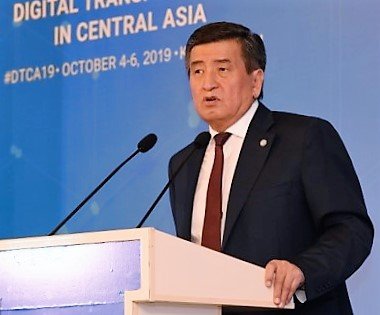President Sooronbai Jeenbekov highlighted digital transformation goals for Kyrgyzstan
Bishkek, (Kyrgyzstan): Technology experts, academics, researchers and government officials at an international conference highlighted the increasing role of information and communication technology in the governance system, public and private enterprise management, education and research.
They discussed the latest approaches to solving intriguing challenges in the fields of data collection and analysis, digitising government services and cybersecurity, and identified trends, says a press release.

The three-day conference on ‘Digital Transformation in Central Asia” at Bishkek last week, was organised by the University of Central Asia, Kyrgyzstan State Committee for Information Technology and Communications, and the High Technology Park.
The conference concluded on October 6 with some broad-ranging recommendations on social and economic development strategies for the host country and the region.
Kyrgyzstan President Sooronbai Jeenbekov who opened the conference, said: “We have set a goal to make Kyrgyzstan the top country in the region in terms of digitization.”
He noted that digital technologies are changing the nature of the global economy by creating opportunities for every country to have wide-ranging involvement in the process.
President Jeenbekov said, “We need to create a new mindset that can use these opportunities and implement in public administration and business effectively.”
The President of the Kyrgyz Republic, Sooronbai Jeenbekov, has proposed the creation of an Advisory Forum of Digital Leaders, as an effective platform for digital transformation for the region. The conference was deemed a resounding success by government and private sector participants, and some key outcomes include a roundtable to be convened periodically to ensure that government strategies keep pace with the latest thinking and research, as well as the establishment of a Council of Chief Information Officers.
The conference was an inspiring example of the positive impact that can come from public-private partnerships. One such example under which selected startups can leverage resources from China, especially the High Technology Park and Shenzhen Open Innovations Lab, is working to develop an innovative ecosystem in the region.
A recurring theme was the importance of learning from the experience of others, and in this regard, it was proposed to embed a smart city approach to urban and rural development planning, learning from Korean examples.

Governor Emilbek Alymkulov elaborated on the potential of piloting a smart city approach in Naryn, with the help of the Kyrgyzstan government, international partners, and the UCA and the plans for implementing a smart city approach in the city.
Human capital and digital literacy were widely acknowledged to be a pre-requisite for any sustainable digital transformation, and to support this objective, business leaders and academics will be working together to scale educational programmes such as computing, social media, and e-commerce. Learning resources will also be made available through a web-based portal.
Alongside these initiatives, an emphasis was placed on improving cybersecurity with strong risk mitigation systems and new policies on the safe use of the Internet as well as new privacy and transparency regulations, modelled on GDPR. Improved infrastructure will also be crucial to underpin the digital transformation strategy, and this will require investments in network coverage across the region as well as cloud services in the country. Taken together, these outcomes combine to create a digital transformation strategy that has the potential to generate significant value for the people of Kyrgyzstan.
Over 20 speakers from 12 countries and over 100 leading technology leaders from Central Asia discussed the current and future technology trends in Central Asia in various sessions including a day-long session at the varsity campus in Naryn.
In his concluding remarks, President Jeenbekov expressed his appreciation to the organisers and said: “I strongly believe that the conference will become an important platform for new and creative ideas on digital transformation and that its success will depend on the joint efforts of all stakeholders.”
The Kyrgyz government has designated 2019 as the “Year of Regional Development and Digitisation”.
UCA Board of Trustees chairperson and the Aga Khan Development Network’s (AKDN) Diplomatic Representative to Kyrgyzstan Dr Shamsh Kassim-Lakha, reaffirmed full support of the varsity and AKDN to work with the Kyrgyz government to advance the important policy recommendations on digitisation articulated by President Jeenbekov.
“Learning and technological advancements are not driving development in a haphazard manner, but are grounded in the ethical, cultural, and normative frameworks of society.”
Besides providing an opportunity for networking with the best minds in the business, the presence of representatives from giants such as Microsoft, Cisco, Oracle, and SAP, as well as telecommunications, mining, and energy sectors in Central Asia, provides a window into the depth of expected dialogue and discussion.
The organisers hoped that the conference marks the beginning of new partnerships and initiatives that sustain and grow digital transformation into the future.
Among the sponsors of the conference was the Russian Federation, UNDP which collaborates with partners to promote policy responses and business decisions to end extreme poverty, curb inequalities, and fast-track progress for the people who have been left furthest behind.
Also see: https://www.facebook.com/ucentralasia/videos/403731517194932/?

The High Asia Herald is a member of High Asia Media Group — a window to High Asia and Central Asia


